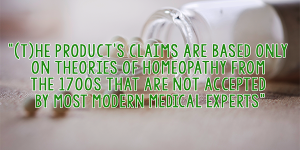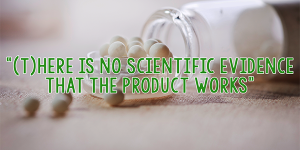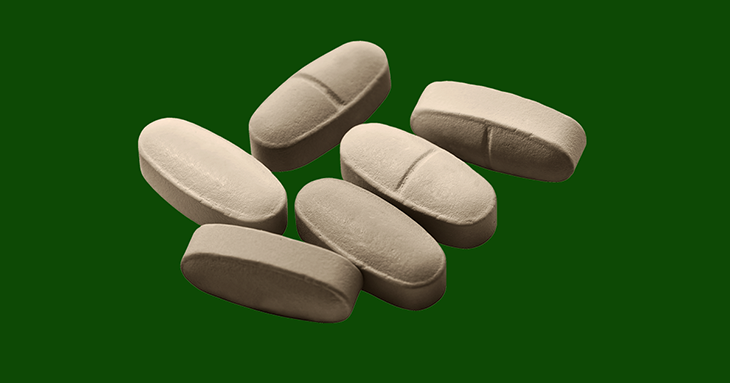
Best Reader Tips of 2021
This year reader tips led to dozens of ad alerts, as well as a complaint to regulators.
Agency asserts that marketing claims for over-the-counter homeopathic products are likely misleading.
Homeopathic products sold over-the-counter (OTC) that claim to treat specific health conditions must have Tests, analyses, research, or studies that have been conducted and evaluated in an objective manner by qualified persona and that are generally accepted in the profession to yield accurate and reliable results. to back up the claims under a new FTC enforcement policy announced by the agency Tuesday. The enforcement policy requires OTC homeopathic medications to be held to the same standards as other products making efficacy claims, such as dietary supplements.

Homeopathy dates back to the 1700s and is based on the theory that “like cures like.” Developed in Germany as an alternative medical treatment and introduced in the U.S. in 1826, it holds that disease symptoms can be treated by tiny doses of substances that produce similar symptoms in healthy people. The remedies are derived from substances that come from plants, minerals, and animals and include individualized treatments. More than five million adults and one million children in the U.S. use homeopathic remedies, according to a 2012 survey.
Homeopathic products on the market include remedies for eczema, acne, psoriasis, heartburn, flatulence, pain, tendinitis, arthritis, menopausal symptoms, ADHD, flu, weight loss, anemia, gum disease, diarrhea, and the common cold. But many homeopathic remedies, according to the U.S. Department of Health and Human Services (HHS), are so diluted that they contain almost no detectable levels of the original substance.
Questionable theory

In its enforcement policy the FTC said “homeopathic theories are not accepted by most modern medical experts” and there are no valid studies using current scientific methods showing their efficacy. Marketing claims for these products, the agency said, “are likely misleading and in violation of FTC regulations.”
If a homeopathic remedy does not have sufficient scientific substantiation, the FTC said marketers must communicate that to consumers and also note that the product’s claims are “based only on theories of homeopathy from the 1700s that are not accepted by most modern medical experts” to avoid being marketed deceptively, under the standards of the new enforcement policy.
But even if those disclosures are made, the agency said, they still might not be sufficient to prevent consumer deception. The policy statement said the FTC will:
carefully scrutinize the net impression of OTC homeopathic advertising or other marketing employing disclosures to ensure that it adequately conveys the extremely limited nature of the health claims being asserted.
The FTC’s enforcement policy statements comes as the FDA continues to re-evaluate its homeopathic regulatory framework.
RELATED: Are Homeopathic Drugs Misleading Consumers?
While the FDA requires that homeopathic products be labeled as such and that the labeling display at least one indication for use, the agency does not evaluate OTC homeopathic drugs for safety or effectiveness. In August 2015, the FTC recommended that the FDA reconsider — or even repeal — its framework for regulating homeopathic medications because the FTC was concerned that it may appear to conflict with its advertising requirements. Specifically, the FTC suggested that the FDA subject homeopathic drugs to the same regulatory requirements as other drug products, eliminate the requirement that homeopathic products have indication instructions on its labels or require that indications be supported by reliable scientific evidence.
Growing industry
There are more than 7,000 homeopathic medicines registered with the FDA, according to the findings of an FTC staff report on the industry released with the new enforcement policy. Of these, about 1,000 are marketed on a routine basis. The $1.1 billion homeopathy industry is growing at a rate of 5 percent a year.
The FTC’s comments to the FDA were submitted as a response to an FDA request in March 2015 for public comment on the homeopathy industry. The FTC said it is concerned that there is a mistaken belief by some advertisers that homeopathic products that are in compliance with FDA policy guidelines do not have to comply with FTC advertising substantiation requirements. The FDA’s current framework may lead some companies to skirt more stringent regulations for OTC drug products and dietary supplements simply by labeling them homeopathic or using homeopathic ingredients in their product formulas, the FTC said.
In September 2015, the FTC held its own workshop to evaluate advertising for OTC homeopathic products and received more than 500 comments on the issue. It concluded that “no convincing reasons have been advanced either in the comments or the workshop as to why efficacy and safety claims for OTC homeopathic drugs should not be held to the same truth-in-advertising standards as other products claiming health benefits.”
Legal scrutiny
A spokesperson for the FDA said the agency “continues to consider information and comments from stakeholders as we reevaluate our policy and has no timeline to share at this time as to when or if any changes will be made.”
The FDA has issued nearly 40 warning letters regarding homeopathic product in recent years. In 2009, the FDA advised consumers to stop using certain Zicam cold remedies, linking the product to a loss of the sense of smell and this September, the agency warned that homeopathic teething tablets and gels may pose a risk to infants and children.
In addition, more than 70 lawsuits have been filed against homeopathic drug companies in the past five years, including more than a dozen class-action complaints.
HHS has warned consumers that there is little evidence to support homeopathy as an effective treatment for any specific condition and that some homeopathic products contain substantial amounts of active ingredients that can cause side effects.
But others in the industry have maintained that the remedies are effective. Dr. Paul Herscu, the founder and director of The New England School of Homeopathy, who represented the American Association of Naturopathic Physicians at the FTC workshop, stated that homeopathic remedies work and should continue to be available OTC.
For more of TINA.org’s coverage of homeopathy, click here.
This year reader tips led to dozens of ad alerts, as well as a complaint to regulators.
Supplement MLM takes down dozens of deceptive claims following TINA.org investigation.
TINA.org files brief urging court to deny final approval of settlement that is unfair to consumers.


